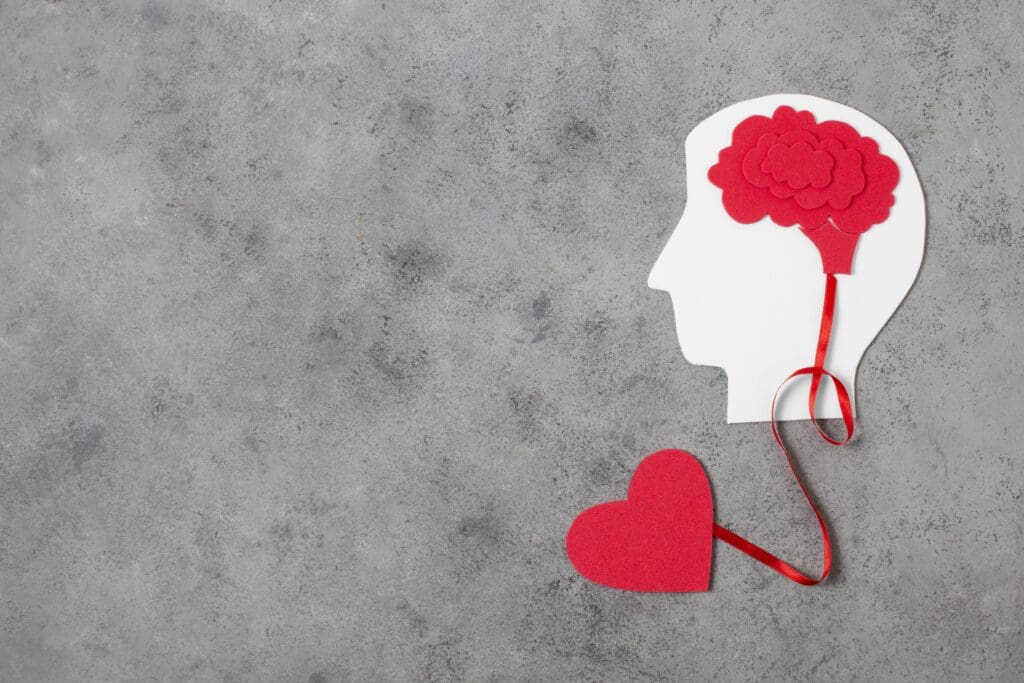
The Impact of Mental Health on Sexual Well-being
As Muslims, our faith prescribes taking care of our mental and physical health. Sexual well-being is a vital part of our overall health, yet the connection to mental health may be overlooked. It is not uncommon to notice that desire, intimacy, and connection with our partners can be deeply impacted if we are struggling with our mental health. Stress, depression, anxiety, and past trauma are just a few challenges that may affect our sexual health. By understanding this link, we can take the first steps toward healing and reclaiming a balanced, fulfilling life.
In this blog, we explore the impact of mental health on sexual well-being, offering insights and practical guidance rooted in both scientific understanding and our Islamic values.
The emotional and psychological connection
Sexual well-being extends far beyond physical health — it is deeply intertwined with our emotional, psychological, and mental state. When we’re feeling emotionally balanced and mentally healthy, we are more open, present, and connected during intimate moments. However, various mental health challenges can impact our ability to enjoy sexual intimacy:
Stress and anxiety: High levels of stress or anxiety can cause a reduced libido. Consistent, or long-term worry about work, relationships, or body image may create mental blocks that make it difficult to feel desire or enjoy intimacy. Research shows that stress hormones like cortisol can directly affect sexual function, reducing both arousal and overall satisfaction.
Depression: Depression may bring forth feelings of apathy, fatigue, and a lack of energy or personal motivation. When someone feels low or disconnected from their own body, it’s common to experience a reduced libido or a sense of detachment during intimate experiences.
Past trauma: For individuals who have experienced acute, communal, or long-term traumatic events, their sexual health may be impacted. Trauma may lead to challenges with intimacy, such as physical discomfort during sex or increased muscle tension and anxiety. One such example is vaginismus, the involuntary contraction of the vaginal opening muscles, making vaginal penetration painful or impossible. It is important to acknowledge that these impacts are very real and may benefit from professional support, such as counseling or therapy, to help heal.
Body image and self-esteem
Our mental health and how we perceive ourselves physically are connected. Negative self-image and low self-esteem, which are often linked to mental health struggles, can prevent us from feeling comfortable and confident in our own skin. This in turn may bring personal doubts about our ability to engage in intimacy. When someone feels disconnected from their body or has emotions of self-consciousness, it can lead to a reduced libido or a lack of desire for intimacy with their husband or wife. For example, individuals who suffer from eating disorders, body dysmorphia, or chronic stress about appearance may have difficulty engaging in sex due to an associated anxiety with their bodies.
By nurturing a positive body image through self-compassion, professional support, and a focus on overall well-being, we can rebuild our confidence and restore our intimate relationships. Remember, taking care of your mental and emotional health is an important part of embracing your physical self.
Relationship dynamics
Mental health challenges don’t only affect us as individuals, but they can also impact our relationships with others. If you are struggling with mental health issues, it can be hard to express your needs and desires clearly. As a result, partners might struggle to understand each other’s boundaries, desires, and emotional needs. For instance, a partner managing depression might withdraw emotionally or physically, leaving the other partner feeling rejected or unsupported. It may be difficult to bridge this conversation if you are experiencing mental health struggles. Similarly, someone coping with anxiety may fear intimacy due to performance worries, creating a cycle of avoidance and frustration.
Open communication is essential. Sharing your feelings with your partner or a trusted loved one can help bridge the gap and foster mutual understanding. Seeking professional guidance, such as couples counseling or individual therapy, can also offer valuable strategies for managing these challenges. By working together, you can build a relationship grounded in compassion, support, and clear communication.
Medication and treatment side effects
Medications used to treat mental health conditions — such as certain antidepressants, anti-anxiety, and other psychiatric drugs — can sometimes have side effects that affect sexual wellbeing. These might include reduced libido and even physical discomfort during intimacy. It’s important to have open communication with a healthcare provider about these side effects so that adjustments can be made, if needed.
It is worth noting that it’s possible to have a natural resurgence in sexual health and well-being if mental health improves. Long-term solutions including therapy and lifestyle changes can contribute to an increased libido. This is why it’s essential to treat both the mind and the body to enhance your overall well-being.
Tips for improving mental health and sexual wellbeing
If you’re struggling with the impact of mental health on your sexual well-being, there are steps you can take to improve both your mental health, and your physical health:
- Seek professional support: If your mental health challenges are affecting your daily life, consider working with a therapist or counselor. Professional support can help you address underlying issues such as depression, anxiety, or past trauma, empowering you to improve both your emotional and physical well-being.
- The NHS provides Mental Wellbeing audio guides for common mental health struggles including low mood, depression, trouble with sleep, and anxiety.
- TALKWORKS (a free-to-access NHS service) is here for adults, age 18+, living in Devon (outside Plymouth) who are struggling with low mood, worry or anxiety.
- The NHS Talking Therapies Service, local Masajid and platforms like Tawfiq Therapies, Sukoon, Maristan, MCAPN and others offer confidential treatment and support, delivered by accredited clinicians.
- Open communication: Having honest, open discussions with your partner about your mental health and its effect on your intimacy can create understanding and reduce feelings of isolation or rejection. A safe space for communication can help ease emotional burdens and strengthen your bond.
- Mindfulness and relaxation: Incorporate mindfulness techniques and stress-relief practices into your daily routine. Whether through dhikr, dua, salah, deep breathing exercises, or simply taking a few quiet moments for yourself, these practices can help reduce anxiety and improve overall well-being.
- Focus on self-care: Taking the time to nurture your mental health through healthy routines, including proper sleep, exercise, and nutritious food, all of which contribute to a better sense of well-being and alleviate the impacts of mental health struggles.
- Work with your healthcare provider: If you feel that your medication is affecting your overall health or sexual wellbeing, discuss possible alternatives with your doctor. A balanced approach that treats both mind and body can help you achieve a more fulfilling and harmonious life.
Big picture: Islamic perspective
Islam recognises sexual desire as a natural and vital part of life. Sexual relations within marriage are not only encouraged but celebrated as an essential component of a healthy, loving relationship. The Prophet ﷺ reminded us, “When a man or a woman marries, he and she have completed half the religion, so let them fear Allāh regarding the remaining half.” (al-Mu’jam al-Awsaṭ 992). This teaching highlights that fulfilling our sexual needs in a halal manner — whether for intimacy, love, or procreation — is an act of worship that complements our spiritual devotion. In fact, sexual intimacy is meant to be a mutually enjoyable and loving experience, where both spouses find tranquility and kindness, as beautifully illustrated in Qur’ān verses such as “And of His signs is that He created for you from yourselves mates that you may find tranquility in them, and He placed between you affection and mercy.” (Qur’ān 30:21)
At the same time, Islam has long acknowledged that mental health and spiritual well-being are deeply interconnected. For centuries, Muslim scholars have explored the emotional and psychological dimensions of human life, recognising that conditions like anxiety, depression, and other emotional challenges affect not only our inner state but also our relationships. Modern research in psychology confirms that spirituality can play a key role in both the prevention and treatment of mental illness. As the 14th-century scholar Ibn al-Qayyim noted, emotional ailments such as anxiety and sadness harm the heart just as physical ailments affect the body, and both require balanced care. The Qur’ān uses relatable stories to show that even the prophets and righteous individuals experienced distress, guiding us to seek solace through dhikr (remembrance), duʿā (supplication), and the promise of eternal joy in Paradise.
In practice, Islam encourages us to nurture our physical, emotional, and spiritual well-being simultaneously. Caring for your body with nutritious foods, adequate rest, and gentle exercise is an essential part of self-care, particularly during delicate phases like menstruation, pregnancy, or postmenopause. At the same time, maintaining open communication in relationships and seeking professional or community support can help manage mental health challenges. By balancing modern self-care with the timeless wisdom of Islamic teachings, you can embrace life’s natural cycles with resilience, love, and gratitude. In doing so, you honour the trust (amānah) Allāh has placed in you, cultivating both inner peace and strong, nurturing relationships.
Conclusion
Many factors, including biological, psychological, and interpersonal aspects of a Muslim woman may impact her mental and sexual health. Mental health is an integral part of sexual well-being, and it’s important to recognise and address the ways in which the two are connected. If you’re struggling, know that you’re not alone, and there are many resources and avenues for support. By nurturing both mental health and sexual well-being, you can build a stronger connection to your body, your partner, and ultimately, to yourself, embracing the fullness of the life Allāh has blessed you with.
May Allah ﷻ grant us healing and strength for both our minds and bodies, guide us to nurture our well-being with His infinite mercy, and bless us with peace, resilience, and abundant support on our journey toward holistic health.

